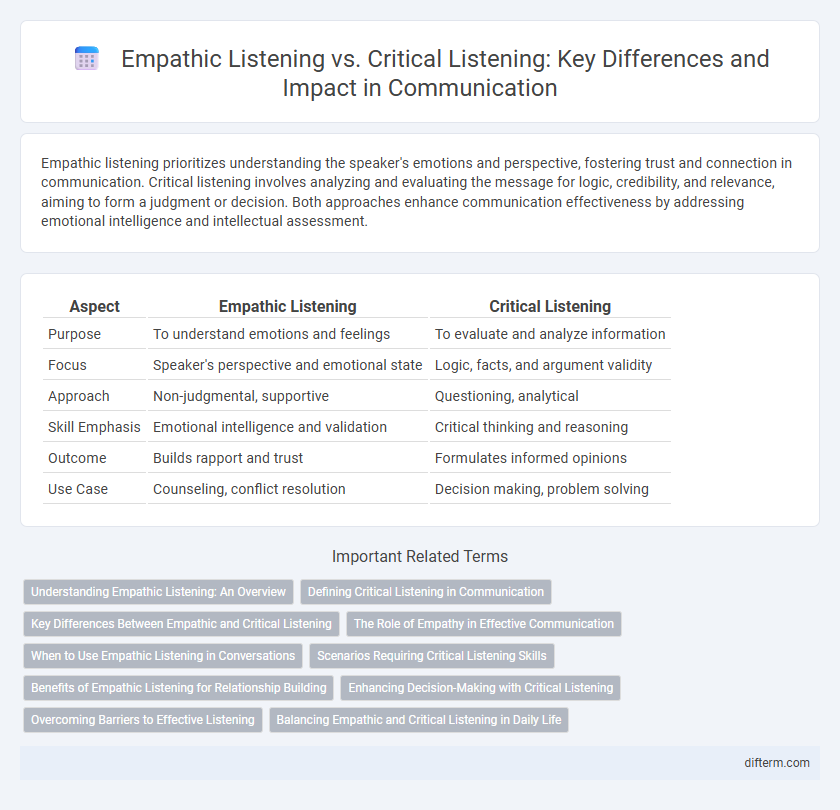Empathic listening prioritizes understanding the speaker's emotions and perspective, fostering trust and connection in communication. Critical listening involves analyzing and evaluating the message for logic, credibility, and relevance, aiming to form a judgment or decision. Both approaches enhance communication effectiveness by addressing emotional intelligence and intellectual assessment.
Table of Comparison
| Aspect | Empathic Listening | Critical Listening |
|---|---|---|
| Purpose | To understand emotions and feelings | To evaluate and analyze information |
| Focus | Speaker's perspective and emotional state | Logic, facts, and argument validity |
| Approach | Non-judgmental, supportive | Questioning, analytical |
| Skill Emphasis | Emotional intelligence and validation | Critical thinking and reasoning |
| Outcome | Builds rapport and trust | Formulates informed opinions |
| Use Case | Counseling, conflict resolution | Decision making, problem solving |
Understanding Empathic Listening: An Overview
Empathic listening involves fully engaging with the speaker's emotions and perspectives, aiming to understand their feelings and experiences without judgment. This form of active listening enhances interpersonal connections by fostering trust and emotional support, essential in conflict resolution and counseling. Unlike critical listening, which evaluates and analyzes the content for accuracy or logic, empathic listening prioritizes emotional resonance and compassionate comprehension.
Defining Critical Listening in Communication
Critical listening in communication involves actively evaluating and analyzing the speaker's message to assess its validity, logic, and relevance. It requires attention to both the content and the underlying intentions, aiming to identify biases, assumptions, and inconsistencies. This form of listening enhances decision-making and problem-solving by fostering deeper understanding and informed judgments.
Key Differences Between Empathic and Critical Listening
Empathic listening prioritizes understanding the speaker's emotions and perspective, fostering connection and trust through active emotional engagement. Critical listening, in contrast, emphasizes evaluating the message's logic, validity, and evidence, aiming to identify arguments, inconsistencies, or biases. Key differences include empathic listening's focus on emotional support and validation versus critical listening's analytical approach to assessing information accuracy and reasoning.
The Role of Empathy in Effective Communication
Empathic listening plays a crucial role in effective communication by fostering understanding and emotional connection between speakers. Unlike critical listening, which focuses on evaluating and judging the message, empathic listening prioritizes recognizing emotions and perspectives, enhancing trust and rapport. This empathetic approach reduces misunderstandings and promotes collaborative problem-solving in both personal and professional interactions.
When to Use Empathic Listening in Conversations
Empathic listening is essential during personal conversations where emotional support and understanding are paramount, such as resolving conflicts or offering comfort. Use empathic listening to validate feelings and build trust by fully engaging with the speaker's emotions and perspectives. This approach fosters stronger relationships and promotes open, authentic communication when the goal is connection rather than evaluation.
Scenarios Requiring Critical Listening Skills
Critical listening skills are essential in professional settings such as business meetings, legal proceedings, and academic debates where evaluating arguments and identifying logical inconsistencies is crucial. This type of listening requires analyzing content for accuracy, relevance, and bias to make informed decisions or form well-grounded opinions. In contrast to empathic listening, critical listening prioritizes objective assessment over emotional connection.
Benefits of Empathic Listening for Relationship Building
Empathic listening enhances relationship building by fostering trust and emotional connection, allowing participants to feel genuinely understood and valued. This approach reduces misunderstandings and defensiveness, promoting open and honest communication between individuals. Prioritizing empathy over judgment strengthens interpersonal bonds and supports collaborative problem-solving in personal and professional settings.
Enhancing Decision-Making with Critical Listening
Critical listening sharpens decision-making by enabling individuals to evaluate arguments, identify biases, and assess the validity of information logically. This focused analysis helps in discerning credible sources and making informed choices based on factual evidence rather than emotions. Enhanced critical listening fosters objective judgment, reducing errors and improving problem-solving in complex communication scenarios.
Overcoming Barriers to Effective Listening
Overcoming barriers to effective listening requires adapting between empathic and critical listening based on context; empathic listening fosters understanding and emotional connection by fully engaging with the speaker's feelings, while critical listening demands analyzing and evaluating the message for accuracy and logic. Common barriers such as distractions, preconceived notions, and emotional biases can be mitigated by consciously shifting focus and applying active listening techniques. Mastering both listening styles enhances communication effectiveness by balancing empathy with critical judgment.
Balancing Empathic and Critical Listening in Daily Life
Balancing empathic and critical listening enhances communication by fostering understanding while maintaining objectivity. Empathic listening involves fully engaging with the speaker's emotions and perspectives, promoting connection and trust. Critical listening requires analyzing and evaluating the message for accuracy and relevance, enabling informed responses and effective decision-making.
empathic listening vs critical listening Infographic

 difterm.com
difterm.com